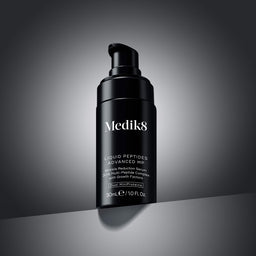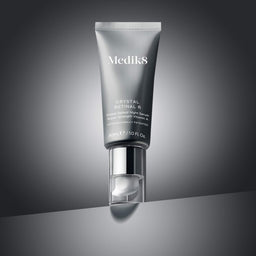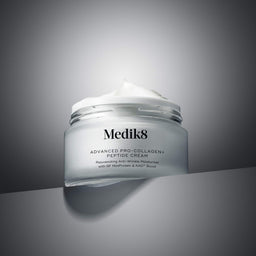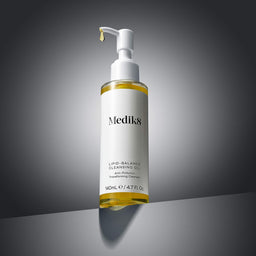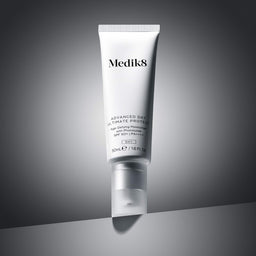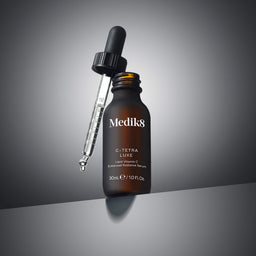One of the hottest topics in the sunscreen industry, skincare users are becoming increasingly concerned about their choice in sunscreen and the impact that they can have on coral reefs. You can rest assured that all Medik8 sunscreens are ‘coral reef friendly’ according to the current market criteria as we do not use octinoxate and oxybenzone. All of our sunscreens comply with the Hawaiian Reef Bill 2021, which bans the sale of sunscreens containing octinoxate and oxybenzone in Hawaii.
We have, however, recently stepped away from using ‘coral reef friendly’ when talking about our sunscreens, as the current science suggests that sunscreens do not have a significant impact on coral reefs. Want to know more about this ever changing topic? Keep reading to learn about our stance on the coral reef debate.
What is the issue?
Chemical filters from sunscreens can dissolve in the ocean while swimming, wearing sunscreen, or when washing it off at home down a drain. According to conversation around sunscreens and their environmental impact over recent years, when certain chemical filters from sunscreens end up in the ocean they can be absorbed by corals. This is thought to disrupt the coral's reproduction and growth cycles, resulting in coral reef bleaching.
The chemical sunscreen filters we mentioned we do not use, octinoxate and oxybenzone, have been specifically linked to coral reef bleaching, and have even been specifically banned in Hawaii due to their potential impact on the coral reefs.
However, when you dig deeper into the coral reef debate, it all gets a little more complicated. As a skincare brand led by science, we turned to the latest research to establish the current facts in this topic which then forms our recommendations to our customers.
What is the science saying?
Many experts on the coral reef disagree with the branding of certain filters as unsafe for the coral reefs. This stems from the fact that there is very limited scientific data on the role that UV filters have on causing harm to the reefs, and the data we do have is undertaken in unrealistic conditions.
The dosage makes the poison
There is a common principle in toxicology which is ‘the dosage makes the poison’ - meaning that everything can be poisonous in large enough amounts, and anything can be safe in small enough amounts. For instance; if you drink 8 glasses of water a day you are probably healthy, but if you drink 8 gallons of water a day it is dangerous. Hence dosage of chemical filters in marine environments is very important when considering how toxic they are to coral reefs.
The dosages present in the current studies undertaken on the impact of sunscreen on coral reefs are representative of unrealistic conditions (i.e they have used much higher doses than would be realistic in normal seawater).[1, 2]
Ultimately, many researchers are of the opinion that the impact of sunscreens on the coral reefs is minimal, and is distracting from the real issue; climate change. Water temperatures rising as a result of climate change is one of the biggest threats to the coral, as seen in the Great Barrier Reef.
“There is limited evidence to suggest that [sunscreens] are causing significant harm to coral reefs.”
In 2021, a team of marine ecologists reviewed the previous data on the impact of sunscreen filters on the coral reefs.[1] They actually found major data gaps and also data reliability issues with several of the high-profile coral toxicity studies that have been used to justify several recent state sunscreen/UV filter restrictions. They concluded; ‘Organic UV filters do occur in the environment, but according to our analysis, there is limited evidence to suggest that their presence is causing significant harm to coral reefs.’ They acknowledged that there are large gaps in data sets and they cannot conclusively say that environmental concentrations of sunscreen filters do not adversely affect the coral reefs, however there is not substantial evidence to treat sunscreen as a risk.
Medik8 Sunscreens
Due to these advances in science, we are stepping away from using ‘coral reef friendly’ when talking about our sunscreens, as the current science suggests that sunscreens in general are not proven to be a significant danger to the coral reefs. This is a currently evolving field of science, and we will be closely monitoring any new research in this area.
References
[1] C. Mitchelmore et al, A Critical Review of Organic Ultraviolet Filter Exposure, Hazard, and Risk to Corals, Environmental Toxicology & Chemistry, 2021, 40(4), pp 967-988. DOI 10.1002/etc.4948
[2] R. Danavaro et al, Sunscreens Cause Coral Bleaching by Promoting Viral Infections, Environmental Health Perspectives, 2008, 116(4), pp 441-447. DOI
← Older Post Newer Post →
